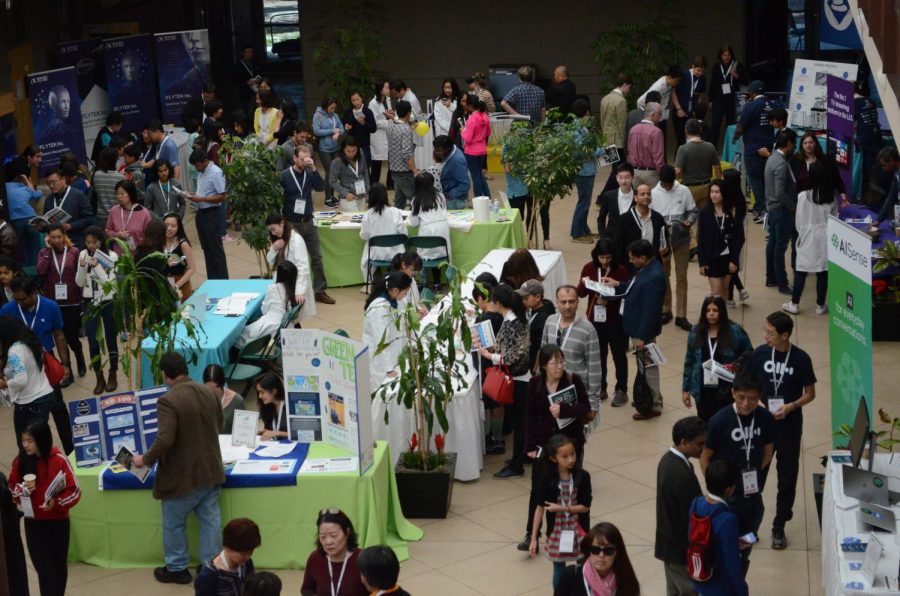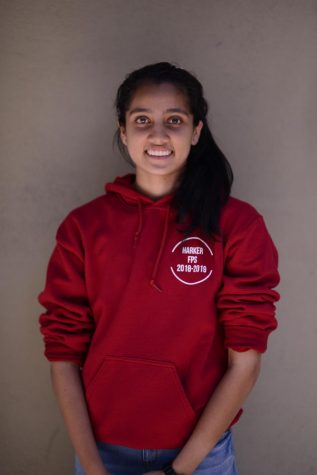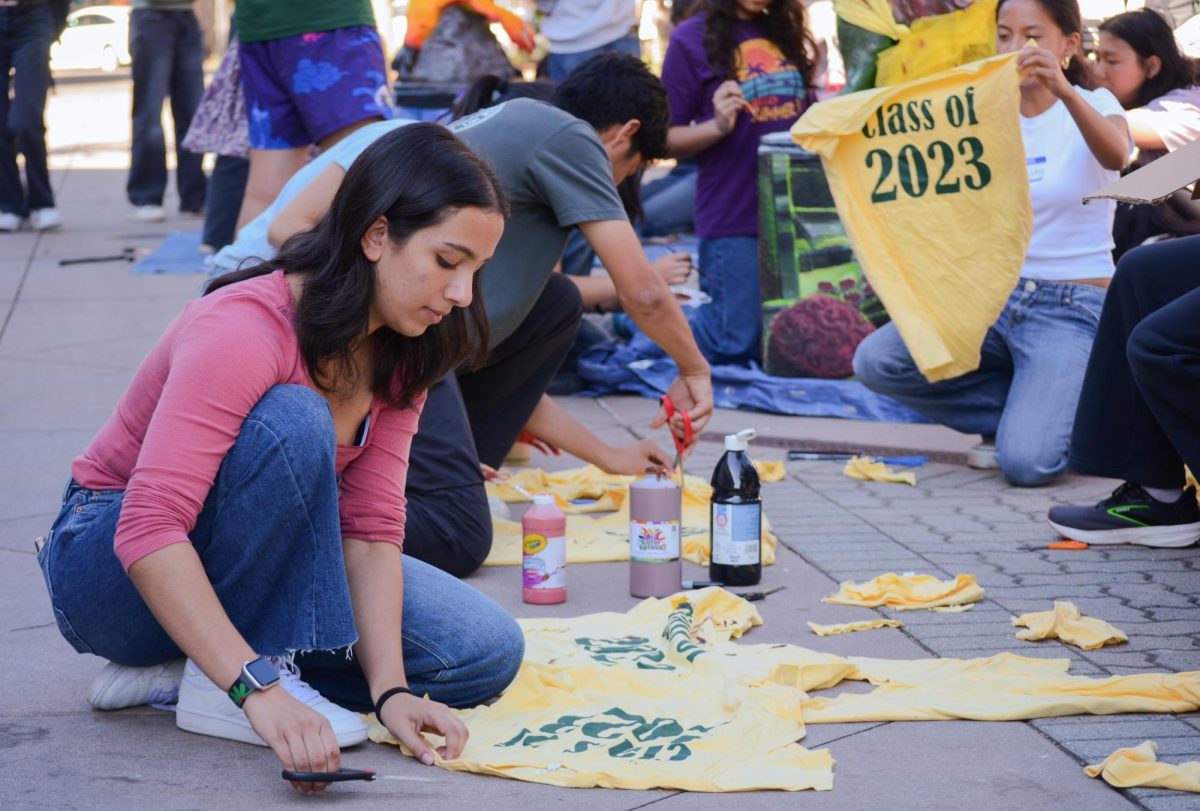Research Symposium spotlights artificial intelligence
Attendees explore booths hosted by student researchers, clubs, tech companies and WiSTEM volunteers. This year’s Symposium theme focused on artificial intelligence.
April 23, 2018
The upper school hosted its annual Research Symposium on Apr. 14, featuring both student and guest speakers, interactive booths and exhibits sponsored by various companies.
WiSTEM, who was in charge of organizing the Symposium, decided the theme (“The Artificial Intelligence Revolution”), organized the logistics and scheduling of the event and invited presenters to share their projects and inventions. Keynote speakers included Jeff Dean, the head of Artificial Intelligence at Google; Dr. Andrew Beck, a former Harvard professor and co-founder of the company PathAI and Ramya Rangan, a Harker alumni who has done much research in computer science and bioinformatics.
“AI is probably going to run the world in the next coming years,” WiSTEM secretary Aarzu Gupta (10) said. “Since we think that the field of AI is so prevalent and will be prevalent in the upcoming years, we decided to make that the theme of Symposium.”
In between presentations, attendees interacted with representatives from companies who were teaching students about their respective inventions, spoke with student researchers both from the upper school and the middle school and participated in various workshops and breakout sessions. The crowd-favorite Chemistry Magic Show, hosted by chemistry teachers Andrew Irvine and Dr. David Casso, featured bursts of fire and experiments with a nitrogen tank.
“WiSTEM’s mission of not only showcasing the scientific achievements of Harker students in community-wide events, but also promoting the leadership and service of women engages a diverse range of people in STEM,” WiSTEM Outreach Director Constance Horng (11) said. “From keynote speakers to STEM Buddies labs to panel discussions, and much more, Symposium is an inclusive event where there is definitely something for everyone.”
Junior Ashwin Rammohan, who attended Symposium, notes how helpful and educational many of the presentations were, especially for someone who is interested in science research like himself. Several high schoolers, like
“I liked the keynote speakers,” Ashwin said. “Their research was fascinating, and it inspired me to think about pursuing research in their fields of study.”
Furthermore, Katherine Tian (11), a Siemens finalist, as well as Justin Xie (12) and Rajiv Movva (12), Regeneron finalists, gave formal talks for attendees to learn more about the research projects they conducted this school year.
“Being able to present is both an honor and a way to give back to Harker for supporting my research endeavors,” Justin said, whose project was to determine the best theoretical supernova model for stars in dwarf spheroidal galaxies. “It really was both another learning experience and a way to show off my cool work.”
WiSTEM also organized several stations and activities mainly targeted for younger attendees as a part of their STEM Buddies program to teach topics ranging from physics and engineering to geophysics and anatomy through on-hands experiments, like blowing bubbles, building boats and playing with a Chinese spouting bowl.
“The stations really got the kids to think and grow their own curiosity,” WiSTEM volunteer Pramiti Sankar (9) said. “It was great to see the kids and even some parents take interest in the science behind the demos we had.”
The club hosted an ice cream party on Friday during lunch to thank the volunteers who helped out at the event and will soon choose officers for the next year. WiSTEM advisor and Science Department Chair Anita Chetty has already begun confirming keynote speakers and the theme of next year’s Symposium.


















![“[Building nerf blasters] became this outlet of creativity for me that hasn't been matched by anything else. The process [of] making a build complete to your desire is such a painstakingly difficult process, but I've had to learn from [the skills needed from] soldering to proper painting. There's so many different options for everything, if you think about it, it exists. The best part is [that] if it doesn't exist, you can build it yourself," Ishaan Parate said.](https://harkeraquila.com/wp-content/uploads/2022/08/DSC_8149-900x604.jpg)




![“When I came into high school, I was ready to be a follower. But DECA was a game changer for me. It helped me overcome my fear of public speaking, and it's played such a major role in who I've become today. To be able to successfully lead a chapter of 150 students, an officer team and be one of the upperclassmen I once really admired is something I'm [really] proud of,” Anvitha Tummala ('21) said.](https://harkeraquila.com/wp-content/uploads/2021/07/Screen-Shot-2021-07-25-at-9.50.05-AM-900x594.png)







![“I think getting up in the morning and having a sense of purpose [is exciting]. I think without a certain amount of drive, life is kind of obsolete and mundane, and I think having that every single day is what makes each day unique and kind of makes life exciting,” Neymika Jain (12) said.](https://harkeraquila.com/wp-content/uploads/2017/06/Screen-Shot-2017-06-03-at-4.54.16-PM.png)








![“My slogan is ‘slow feet, don’t eat, and I’m hungry.’ You need to run fast to get where you are–you aren't going to get those championships if you aren't fast,” Angel Cervantes (12) said. “I want to do well in school on my tests and in track and win championships for my team. I live by that, [and] I can do that anywhere: in the classroom or on the field.”](https://harkeraquila.com/wp-content/uploads/2018/06/DSC5146-900x601.jpg)
![“[Volleyball has] taught me how to fall correctly, and another thing it taught is that you don’t have to be the best at something to be good at it. If you just hit the ball in a smart way, then it still scores points and you’re good at it. You could be a background player and still make a much bigger impact on the team than you would think,” Anya Gert (’20) said.](https://harkeraquila.com/wp-content/uploads/2020/06/AnnaGert_JinTuan_HoHPhotoEdited-600x900.jpeg)

![“I'm not nearly there yet, but [my confidence has] definitely been getting better since I was pretty shy and timid coming into Harker my freshman year. I know that there's a lot of people that are really confident in what they do, and I really admire them. Everyone's so driven and that has really pushed me to kind of try to find my own place in high school and be more confident,” Alyssa Huang (’20) said.](https://harkeraquila.com/wp-content/uploads/2020/06/AlyssaHuang_EmilyChen_HoHPhoto-900x749.jpeg)










